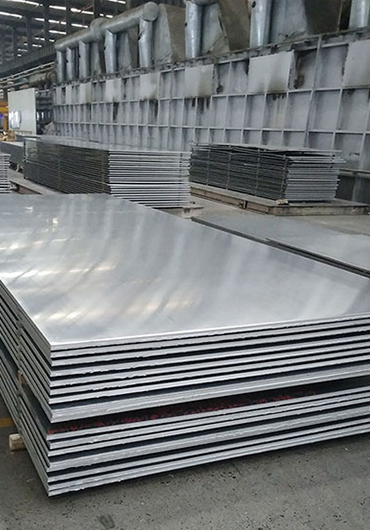High Nickel Alloys
Nickel Alloy Grade
ASTM / ASME SB 163 / 165 UNS 4400 (MONEL 400) ASTM / ASME SB 704/705 UNS 8825 INCONEL (825) ASTM / ASME SB 167 / 517 UNS 6600 (INCONEL 600 ) ASTM / ASME SB 167 UNS 6601 ( INCONEL 601 ) ASTM / ASME SB 704 /705 UNS 6625 (INCONEL 625)

Hastelloy C-276 Alloy
Super alloys offer high corrosion, creep, and oxidation resistance. It is also very stable under high temperature and stress conditions. Hastelloy C276 is a welded super alloy containing nickel, chromium, and molybdenum.
It has relatively little carbon and is regarded as one of the most diverse in terms of corrosion resistance. As a result, the alloy has a wide range of applications in chemical settings. The alloy has various alloying elements, including nickel as the base element, as well as equal proportions of molybdenum and chromium; the other components in the grade offer balance in its qualities.
This grade contains tungsten, which resists pitting corrosion, and molybdenum, which resists other localised corrosion attacks. To achieve the desired hardness, a trace amount of vanadium is added. Other alloying elements ensure that the grade is machinable and that its mechanical qualities are retained at high enough temperatures.
Because it is a solid-phase solution alloy, it is naturally durable. Because it is a nickel compound, the alloy is resistant to a variety of chemicals, enhances toughness, and provides overall corrosion resistance. Hastelloy C276 is a rare alloy capable of withstanding moist chloride gas, chlorine dioxide, and hypochlorite solutions. It resists chloride stress corrosion cracking and other chloride solutions quite well. When tested for cracking under 45% boiling magnesium chloride, the grade 316L cracked in 2 hours, the grade 254SMO cracked in 24 hours, and the Hastelloy C276 cracked in 1000 hours. The alloy's microstructure makes it excellent for welding, forming, and machining. Because of the low carbon concentration, the alloy is resistant to intergranular corrosion in heat-affected zones. The grade went into applications to lessen the concerns concerning welding. The low carbon concentration limits carbide production at grain boundaries.
The alloy also possesses high impact strength, with a 10mm thick plate able to sustain 470J at room temperature in the Charpy v-notch test. As a result, it is used in dynamic applications. The alloy is easily extruded, hot worked, and cold worked. The alloy may have a tendency to work harden. This alloy avoids the strain age cracking problem that is frequent in other reinforced alloys at high temperatures. Hot working may be done safely at temperatures ranging from 880 to 1240°C, with heavier portions requiring a minimum of 1100°C before forming. The alloy demonstrates its adaptability in a variety of situations and may be easily processed and utilised in a wide range of applications.
Inconel
Nickel is the main ingredient of INCONEL alloy 600 (Nickel- Chromium- Iron), which gives the compound resistance to chloride-ion stress corrosion and allows it to be used in reactor water systems. The significant quantity of chromium in its composition provides high corrosion and oxidation resistance. Otherwise, INCONEL alloy 600 is ductile at all temperatures. Even at high temperatures, the poison's ratio stays in the range of 0.324-0.339, indicating an adequate proportion of lateral strain to longitudinal strain that may be exploited in engineering.
The alloy has a high specific heat value, which increases as the alloy temperature rises. As a result, this may be utilised to absorb heat. It also has an adequate level of heat conductivity. Tensile strength improves significantly at cryogenic temperatures. Brinell hardness of hot rolled alloy, which is 182 at room temperature, drops significantly at 400°C and then becomes constant at around 135.
Engineering materials must pass impact tests. Even at lower temperatures, the alloy stays robust and resists brittleness, making the alloy useful in that range. The alloy absorbs 244 Joules at ambient temperature. The shear strength of an annealed cold rolled sheet is 419.2 megapascal, while the Rockwell hardness is 71B. Because engineering applications frequently include cyclic loads, the fatigue strength of the material becomes critical. Even at high temperatures, a rotating-beam fatigue test (10 8 cycles) on cold drawn, annealed rod displays the pattern of its fatigue strength. The fatigue strength stays constant from room temperature to approximately 340 megapascal at 200°C, but declines to 325 megapascal as the temperature rises between 320°C and 420°C. As the temperature rises, the alloy's fatigue strength falls from 310 megapascal at 420°C to around 105 megapascal at 780°C. INCONEL alloy 600's microstructure displays a stable austenitic phase. It also has a solid solution containing cyanonitrides and chromium carbides that have precipitated. At stream generator operating temperatures, microstructural changes in alloy 600 are unlikely. If certain unmeasurable microstructural changes occur, they will not have a deleterious influence on the intergranular stress corrosion cracking resistance.
In the use of furnaces and heat-treating areas, engineering materials that are resistant to oxidation and scaling are required. Carburizing alloy 600 at 925°C results in a weight gain of 2.66 mg/cm 2, but carburising INCOLOY, 800HT, and Type 330 Stainless Steel results in weight gains of 4.94 mg/cm 2 and 6.42 mg/cm 2, respectively. This demonstrates alloy 600's outstanding resistance to carburisation, even at high carburising temperatures. It is resistant to neutral and alkaline salt solutions in addition to sulphur compounds. As a result, it is employed in caustic conditions. ASTM, ASME, SAE, ISO, DIN, and other standards are used to produce the alloy's products.
The ASTM specifications for Inconel alloy 600 Seamless tubing, Welded tubing, Seamless pipe, and Welded pipe are B163, B516, B167, and B517, respectively. The weld's impact strength varies between 57 and 66 Joules from cryogenic to high temperature. UNS N06600 and W. Number 2.4816 are the designations for INCONEL alloy 600. When it comes to the combination of adequate toughness, good strength, significant thermal characteristics, oxidation and corrosion resistance, INCONEL alloy 600 becomes a wonderful material.
Monel
Nickel-copper alloys with trace quantities of iron and other alloying elements are known as monels. They are thought to be stronger than pure nickel and offer great resistance to a broad range of conditions and chemical agents, particularly those found in the marine environment. Monel 400 is a solid-enhanced solution alloy with the majority of its alloying components in solid phase in the microstructure. It has a face-centered cubic lattice structure and is a binary alloy. It retains its toughness and mechanical qualities even at cryogenic temperatures of around 480°C. Even at cryogenic temperatures, the grade does not change from ductile to brittle.
At 24°C, the impact strength is 220 ft. lbs., whereas at -190°C, the strength remains 196 ft. lbs. As a result, there is no sign of transition or fracture. Strength and hardness are kept with minimum loss of ductility and impact characteristics. If creep and rupture characteristics of up to 540°C are achieved under strong oxidising conditions, the grade may be suitable in a variety of additional applications. Monel 400 is more resistant to oxidation than higher copper alloys. As a result, the alloy may be used in a variety of situations. The fatigue strength of the alloy's hot-rolled specimen is 290 MPa after 108 cycles (rotating beam test).
The alloy is therefore suitable for use in applications that need movement. The alloy's shear strength when hot rolled is still approximately 340 MPa. The grade can be utilised in related applications since it is typically magnetic at ambient temperature. After cold working or welding, the material's magnetic characteristics could alter. Alloy that has been annealed has lesser strength and must be properly tempered to increase strength. The hardening of the alloy is improved by the application of cold working. The grade is especially utilised for its strength in torsion and impact. The alloy's hot-rolled specimen absorbs 220 ft. lbs. in the Charpy v-notch test and 120 ft. lbs. in the Izod test.
Due to the alloy's relative softness compared to other grades, hot shaping is quite practical and practically any desired shape may be achieved. The alloy is easily produced, shaped, and machined. The alloy may effectively supply the requisite mechanical qualities for the requested applications with the right quantity of hot work, cold work, and required heat treatment. The alloy is frequently pickled to provide a clear and superior surface.
High Nickel Alloys Specifications
EXPORT COUNTRIES
Ethiopia | South Africa | Ghana | Tanzania | Argentina | Bolivia | Brazil | Chile | Colombia | Ecuador | Guyana | Paraguay | Peru | Suriname | Uruguay | Venezuela
Our Products

Send us your enquiry today
We respond to all enquiries within 24 hours. Click on contact to send your requirement.
Contact us

